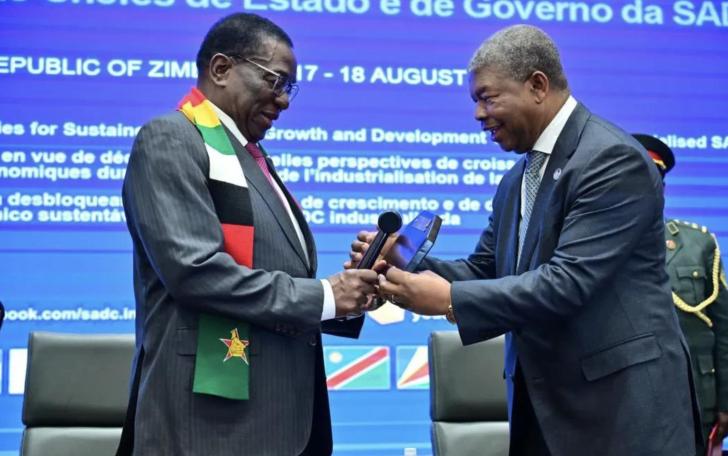News / National
Mnangagwa fails to reverse poll report
11 Sep 2024 at 11:01hrs |
0 Views

President Emmerson Mnangagwa missed a crucial opportunity to address the controversy surrounding the 2023 general elections during the recent 44th SADC summit held in Harare. Despite his high-profile role as the new chair of the Southern African Development Community (SADC), Mnangagwa was unable to amend, reinterpret, or counter the critical SADC Electoral Observer Mission Report that condemned his re-election.
Mnangagwa's assumption of the SADC chairmanship on August 17 sparked enthusiasm among his Zanu-PF supporters and government-owned entities. The summit was significant for Mnangagwa not just for the ceremonial role but as a chance to gain legitimacy on the international stage.
Following the August elections, Mnangagwa faced intense scrutiny from regional leaders concerned about the polls' integrity. The opposition Citizens Coalition for Change (CCC) failed to challenge the results in court, reportedly due to insufficient evidence and a lack of effective polling agents.
Zambian President Hakainde Hichilema, who chairs the SADC organ on politics, defense, and security cooperation, appeared to advocate more strongly for the opposition's concerns than the opposition itself. The SADC Electoral Observer Mission's report criticized the Zimbabwe elections for breaching the country's constitution, the Electoral Act, and SADC's democratic election principles, deeming them neither free nor fair.
The controversial report was presented to SADC leaders at an extraordinary summit in Luanda, Angola, on November 4, 2023. Despite Harare's efforts to exclude the election issue from the agenda, the summit appointed a sub-committee—including representatives from Angola, Namibia, and Tanzania—to address the situation.
SADC Chair President João Lourenço of Angola and Hichilema successfully resisted pressure from Mnangagwa and Zimbabwe's Foreign Affairs Minister Fredrick Shava to omit Zimbabwe from the agenda. Prior to this summit, SADC's Council of Ministers and the troika on politics, defense, and security held virtual meetings to discuss the DRC and Zimbabwe.
The Zanu-PF and Zimbabwean government officials, including spokespersons Chris Mutsvangwa and George Charamba, launched severe attacks against the election observers, particularly former Zambian Vice-President Nevers Mumba and Hichilema. These attacks were strongly rebuffed by Mumba and Hichilema.
In the lead-up to the summit, Mnangagwa engaged in lobbying efforts at the United Nations General Assembly in September, aiming to influence SADC leaders who had called for an extraordinary summit after the preliminary report flagged significant electoral violations.
The final SADC report reaffirmed the initial concerns, reinforcing the view that Zimbabwe's elections were not credible. The summit, chaired by Lourenço, was attended by various heads of state and government or their representatives, including DRC President Félix Tshisekedi, South Africa's President Cyril Ramaphosa, and other regional leaders.
The ongoing debate highlights the enduring challenges faced by Zimbabwe's political landscape and the complex interplay of regional and international diplomacy.
Mnangagwa's assumption of the SADC chairmanship on August 17 sparked enthusiasm among his Zanu-PF supporters and government-owned entities. The summit was significant for Mnangagwa not just for the ceremonial role but as a chance to gain legitimacy on the international stage.
Following the August elections, Mnangagwa faced intense scrutiny from regional leaders concerned about the polls' integrity. The opposition Citizens Coalition for Change (CCC) failed to challenge the results in court, reportedly due to insufficient evidence and a lack of effective polling agents.
Zambian President Hakainde Hichilema, who chairs the SADC organ on politics, defense, and security cooperation, appeared to advocate more strongly for the opposition's concerns than the opposition itself. The SADC Electoral Observer Mission's report criticized the Zimbabwe elections for breaching the country's constitution, the Electoral Act, and SADC's democratic election principles, deeming them neither free nor fair.
The controversial report was presented to SADC leaders at an extraordinary summit in Luanda, Angola, on November 4, 2023. Despite Harare's efforts to exclude the election issue from the agenda, the summit appointed a sub-committee—including representatives from Angola, Namibia, and Tanzania—to address the situation.
SADC Chair President João Lourenço of Angola and Hichilema successfully resisted pressure from Mnangagwa and Zimbabwe's Foreign Affairs Minister Fredrick Shava to omit Zimbabwe from the agenda. Prior to this summit, SADC's Council of Ministers and the troika on politics, defense, and security held virtual meetings to discuss the DRC and Zimbabwe.
The Zanu-PF and Zimbabwean government officials, including spokespersons Chris Mutsvangwa and George Charamba, launched severe attacks against the election observers, particularly former Zambian Vice-President Nevers Mumba and Hichilema. These attacks were strongly rebuffed by Mumba and Hichilema.
In the lead-up to the summit, Mnangagwa engaged in lobbying efforts at the United Nations General Assembly in September, aiming to influence SADC leaders who had called for an extraordinary summit after the preliminary report flagged significant electoral violations.
The final SADC report reaffirmed the initial concerns, reinforcing the view that Zimbabwe's elections were not credible. The summit, chaired by Lourenço, was attended by various heads of state and government or their representatives, including DRC President Félix Tshisekedi, South Africa's President Cyril Ramaphosa, and other regional leaders.
The ongoing debate highlights the enduring challenges faced by Zimbabwe's political landscape and the complex interplay of regional and international diplomacy.
Source - newshawks
Join the discussion
Loading comments…
































